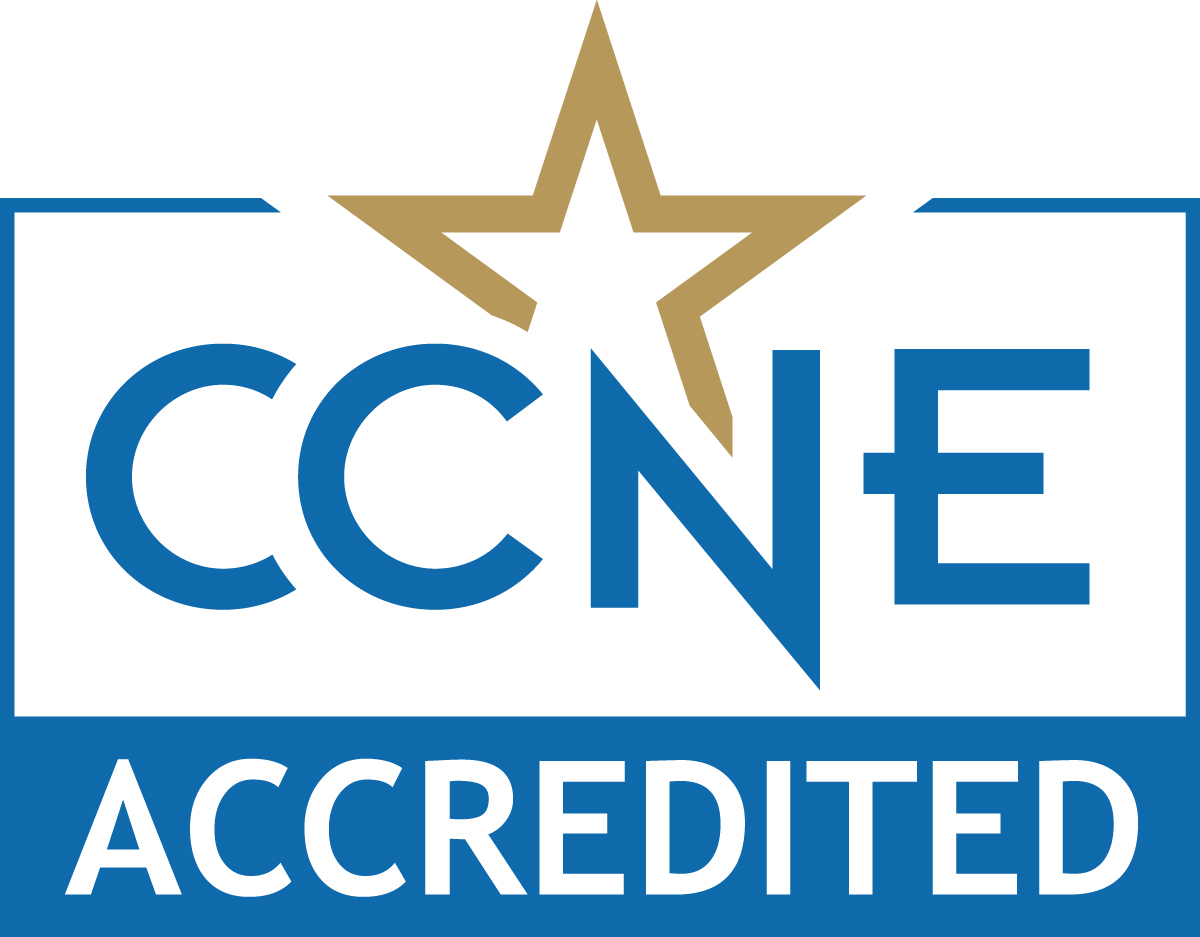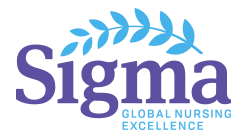
At Charter Oak, we’re educating the nurse of the future with our online Nursing: RN/ADN to BSN program! If you have an active RN license and are seeking a trusted online educational partner to earn your Bachelor of Science in Nursing, our program has been created with you in mind. Read more about the program.
In addition to CCNE Accreditation, the program is licensed and accredited by the Connecticut Board of Regents for Higher Education.
Currently Charter Oak may enroll students from all US states except GU, IA, MI, MS, SD, TN, VT, WA, WI, and WY. According to the National Council of State Boards of Nursing, the boards of nursing in these states require specific approval of any RN/ADN to BSN program that enrolls RNs from their state. Charter Oak is currently seeking approval in these states; as these approvals are granted this webpage will be updated.
This major requires a minimum of 120 credits. All major requirements must be completed with a grade of 'C' or higher. Applicants may transfer in two (2) courses from another RN/ADN to BSN program with grades of ‘C’ or above, from other regionally accredited institutions. The credits must be equivalent to the content and credit amount offered in one of the required courses of the program, subject to approval of the Nursing Director.
NUR 301: Baccalaureate Nursing Role
3 creditsNUR 310: HC Policy, Economics, Regulation, & Ethics
3 creditsNUR 315: Nursing Research & Expanded EBP
4 creditsNUR 320: Population Health
4 creditsNUR 400: CQI, Safety, & IP Collaboration
4 creditsNUR 410: Systems Leadership/Continuum of Care
4 creditsNUR 494: Final Preparation for the Baccalaureate Nursing Capstone
1 creditNUR 495: Baccalaureate Nursing Capstone
4 credits
Admission to the Nursing: RN/ADN to BSN program is selective. Candidates to the program must have:
- A minimum calculated Grade Point Average (GPA) of 2.3, based on the Charter Oak State College Nursing Program of Study (Advising Worksheet).
- Graduated from a nationally accredited (ACEN, CNEA) Associate Degree in Nursing or Diploma Nursing Program. *
- A current, unencumbered RN license from a territory or state of the United States of America. **^
* Applicants who hold a current, unencumbered RN license from a US state or territory, but did not graduate from a nationally accredited (ACEN,CNEA) Associate Degree in Program in Nursing or Diploma Nursing Program, will be subject to the following admissions conditions:
- Credentials from non-U.S. colleges must be evaluated by Educational Credential Evaluators (ECE) or World Education Services (WES). The College must be determined to have the equivalent of US Regional Accreditation by ECE or WES in order for the credits to be transferable.
- Once admitted to the College the student must successfully complete IDS101 and NUR 301 on the first attempt or will be withdrawn from the Nursing Program.
** Applicants who have not yet received their RN license, but meet other admissions requirements, will be permitted to enroll in the college for one semester. Proof of RN licensure must be provided for continued enrollment.
- Dawn Bunting, EdD, MSN, RN, CNE, FAADN, Read Bio
- Deirdre Doyle, Read Bio
- Ellen O. Duell, APRN, CWOCN, ACNS-BC, Read Bio
- Jessica Gabriele, ASN, DNP, Read Bio
- Stephanie G. Knutson, Ed.D, RN, Read Bio
- Tammy Marquis, Read Bio
- April McGrath, DNP, RN, NPD-BC, CENP, Read Bio
- Kathryn Murphy, Ed.D, MSN, RN, Read Bio
- Samantha Parillo, BSN, MSN, Read Bio
- Linda M. Perfetto, PhD, MS, RN, CNE, CNOR, FAADN, Read Bio
- Lisa Rioux, CNML, MSN, BSN, RN, Read Bio
- Dr. Maribel Rivera Smith, Read Bio
- Sheila Solernou, EdD, MSN, BSN, RN, Read Bio
- Nicole Williams, Read Bio
Outcomes & Pathways
Students who graduate with a major in Nursing: Nursing: RN/ADN to BSN will be able to:
- Demonstrate a strong foundation in evidence-based nursing practice through purposeful, informed, outcome-oriented thinking and action that reflects a commitment to lifelong learning.
- Utilize and apply knowledge, critical thinking, and clinical decision-making skills to make sound clinical judgments that identify and address individual, population, and organizational challenges.
- Integrate leadership skills of systems thinking, communication and change facilitation to meet patient care and organizational needs across the continuum of care.
- Guided by the acquisition of a liberal arts education, utilize an ethical framework to advocate for patients amid economic, political, social, and demographic forces affecting the delivery of regional, national, and global healthcare.
- Integrate determinants of health and patients’ cultural beliefs and practices into the delivery and management of care to promote health across the lifespan.
- Interact using effective communication skills with patients, families, and interprofessional team members that fosters mutual respect and shared decision making to enhance patient satisfaction and health outcomes.
- Apply evidence-based practice models to identify and integrate scientific evidence to address practice issues and assure quality nursing care outcomes.
- Advocate for and participate in patient safety and quality initiatives as a member of the interprofessional healthcare team.
- Utilize informatics and patient care technology to enhance communication in the provision and management of safe, effective patient care.
- Incorporate professional nursing standards and accountability into practice as a member of the interprofessional healthcare team.
Question: How do I redeem my qualified credential(s) for undergraduate and/or graduate college credit with Charter Oak?
Answer: Tell us which credentials/certifications you’ve earned when you apply along with your member ID. We’ll do the rest. View the full list of evaluated professional credentials for credit.
- Certified Coding Associate (CCA) up to 20
- Certified Coding Specialist (CCS) up to 23
- Certified Documentation Improvement Practitioner (CDIP) up to 19
- Certified Inpatient Coder (CIC) up to 17
- Certified Clinical Medical Assistant (CMA) up to 10
- Certified Nurse Aide (CNA) up to 4
- Neurophysiologic Intraoperative Monitoring (CNIM) up to 35
- Certified Outpatient Coder (COC) up to 23
- Certified Professional Biller (CPB) up to 9
- Certified Professional Coder (CPC) up to 19
- Certified Professional Compliance Officer (CPCO) up to 23
- Health Information and Management Systems, Certified Professional (CPHIMS) up to 9
- Certified Professional Medical Auditor (CPMA) up to 25
- Certified Phlebotomy Technologist (CPT) up to 4
- Risk Adjustment Coder (CRC) up to 23
- Clinical Research Coordinator (CRC) up to 29
- Emergency Medical Services Responder (EMR) up to 2
- Emergency Medical Services Technician (EMT) up to 6
- Emergency Medical Services Technician, Advanced (EMT-A) up to 8
- Health Services Executive (HSE)* up to 19
- Nurse, Licensed Practical (LPN) up to 16
- Magnetic Resonance Imaging technician (MRIT) up to 16
- Registered Behavioral Technician (RBT) up to 3
- Registered Electroencephalographic Technologist (RET) up to 19
- Registered Health Information Administrator (RHIA) up to 48
- Registered Health Information Technician (RHIT) up to 37
- Registered Medical Assistant (RMA) up to 24
- Nurse, Registered (RN) up to 64
- Radiologic Technologist (RT) up to 33
- Paramedic up to 41
*Approved for Graduate level.

The Nursing: RN/ADN to BSN program at Charter Oak State College is accredited by the Commission on Collegiate Nursing Education, 655 K Street NW, Suite 750, Washington, DC 20001, 202-887-6791, https://www.ccneaccreditation.org/.

Charter Oak State College's RN/ADN to BSN program joins the Iota Upsilon at large chapter of Sigma.
- 100% online
- Credit for credentials
- Six (6) start dates
- Expert Faculty
